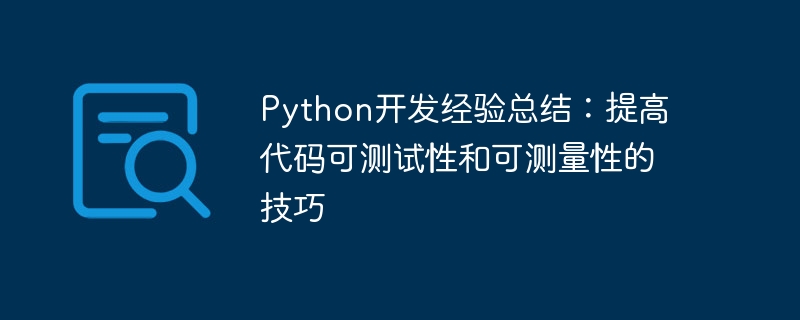

With the continuous application of Python in the fields of software development and data science, more and more developers are beginning to face the problems of code testability and measurability. In this article, we will discuss some techniques designed to improve the testability and measurability of Python code.
1. Write unit test code
Unit testing is a testing method that verifies the correctness of the code by separating different parts of the code and testing them individually. Therefore, when writing Python code, in order to improve its testability and measurability, we should give priority to unit testing. By writing unit tests, we can easily test and verify various parts of the code to ensure that the code can run normally in actual applications.
2. Use functional programming
Functional programming allows us to avoid writing untestable code. Every function in functional programming should only accept input and return output, without relying on any external variables or state modifications. This means we can write testable code more easily and have better verification of functions in unit tests.
3. Use dependency injection
The dependency injection method avoids writing untestable code by passing code dependencies to functions. Doing this makes it easier to write more testable code and provide better verification of code functions in unit tests. In Python, we can use dependency injection libraries such as injector.
4. Write measurable code
In order to improve the testability of the code, we should also consider the measurability of the code. To write measurable code, we should avoid writing hard-coded and weakly typed code, use constants instead of magic numbers, and describe the code using comments and documentation to better understand the purpose and behavior of the code.
5. Use code specifications and style guides
Using code specifications and style guides can help us write code that is more readable, maintainable, and testable. Python has some popular coding conventions and style guides, such as PEP 8 and Google Python Style Guide. Following these norms and guidelines will make the code we write more consistent and easier to understand.
6. Use code coverage tools
Test coverage tools can help us evaluate the quality and coverage of the test set. In Python, we can use some popular code coverage tools such as coverage and pytest-cov. Using these tools can help us find code and test cases that are not covered, so that we can improve test cases and code in a timely manner.
In summary, Python is a powerful, flexible, and easy-to-learn programming language that is widely used in the fields of software development and data science. By following the tips above, we can write Python code that is more testable and measurable, and improve the quality and maintainability of our code during development.
The above is the detailed content of Summary of Python development experience: Tips to improve code testability and measurability. For more information, please follow other related articles on the PHP Chinese website!




